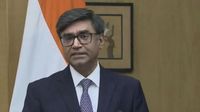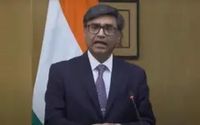On Thursday, May 8, 2025, tensions between India and Pakistan escalated as India’s Foreign Secretary Vikram Misri addressed the media following a significant military operation. The briefing, held in New Delhi, came just a day after Indian armed forces executed a strike, codenamed Operation Sindoor, targeting terrorist infrastructure in Pakistan and Pakistan-occupied Kashmir (PoK), which resulted in the deaths of approximately 100 militants.
During the news conference, Misri was questioned about reports suggesting that the National Security Advisors (NSAs) of both countries were in contact amid rising tensions. He stated, "I have no information with regard to contacts between the two National Security Advisors..." This statement was made in response to inquiries about whether India was considering severing diplomatic ties with Pakistan, to which Misri emphasized, "nothing further from the decision already spelled out by the government."
The backdrop to this military action was a recent terror attack on April 22, 2025, in Pahalgam, Jammu and Kashmir, where 26 civilians lost their lives. Misri highlighted that the operation was a direct response to the escalating violence originating from Pakistan.
Misri asserted that India’s actions were not intended to escalate the situation further, saying, "Our intention has not been to escalate matters. We are only responding to the original escalations." He clarified that the military strikes were targeted, precise, and controlled, aimed solely at terrorist infrastructure rather than military targets.
In his remarks, Misri criticized Pakistan’s role in the Pahalgam attacks, specifically calling out the involvement of the group known as The Resistance Front, which he identified as a front for the Pakistan-based terrorist organization, Lashkar-e-Taiba. He noted, "I pointed this out yesterday that The Resistance Front group is a known front for the well-known Pakistan-based terrorist organization, Lashkar-e-Taiba."
Misri also addressed the misinformation circulating regarding India’s military operations, stating, "There is a lot of unfounded disinformation and fabrication that has come from across the border, and I would just like to use this opportunity to set the records straight on some of these issues." He rejected allegations that India had targeted religious sites during the strikes, emphasizing that the targets were strictly terrorist facilities.
Furthermore, he highlighted the lack of progress in investigations into past terrorist attacks, including the 2008 Mumbai attacks, despite extensive evidence provided to Pakistan. Misri accused Pakistan of using evidence to shield terrorists and obstruct investigations, stating, "There is reason to believe that Pakistan uses the evidence that we provide only to cover its tracks, and in fact defend the terrorists who we are looking for, and obstruct the path of investigation."
On the topic of civilian casualties, Misri refuted claims made by Pakistan, affirming that all attacks were aimed at terrorist infrastructure. He remarked, "We have made the point very clearly that all attacks on the morning of 7th May were against carefully selected terrorist infrastructure, terrorist targets." Misri also condemned Pakistan's targeting of civilians, particularly the Sikh community, citing a recent attack on a Gurdwara in Poonch that resulted in the deaths of at least three individuals.
In a broader context, Misri addressed the Indus Water Treaty, stating that Pakistan's refusal to engage in negotiations to modify the treaty constitutes a violation. He explained that India has honored the treaty for over six decades, even during periods of conflict, while accusing Pakistan of hampering India's rights to its legitimate waters under the treaty. He asserted, "Pakistan has been acting in violation of the treaty," and emphasized the need to consider technological changes and advancements when discussing the treaty.
Misri's remarks came amidst a backdrop of escalating tensions and accusations between the two countries. He firmly stated, "This is an absolute and complete fabrication and a blatant lie… If this kind of claim is a pretext for targeting Indian infrastructure of a similar nature, Pakistan will be entirely responsible for the consequences that will undoubtedly follow."
As India and Pakistan navigate this precarious situation, the international community watches closely, hoping for a resolution that can prevent further violence. Misri’s statements reflect a strong stance from India, emphasizing a commitment to national security while also highlighting the complexities of diplomatic relations in a region fraught with historical tensions.





